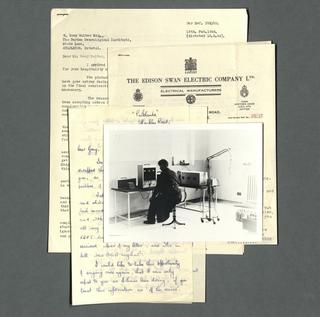
The Burden Neurological Institute
The Burden Neurological Institute (BNI) is an independently-funded research unit and registered charity specialising in the investigation and treatment of neurological, psychological, and psychiatric disorders. The BNI opened in 1939 at the Stoke Park Colony in Bristol, England.
The BNI was named after philanthropist Rosa Gladys Burden (1891-1939). Burden’s husband, Reverend Harold Nelson Burden (1859-1930), founded the Stoke Park Colony with his first wife Katherine Mary Burden (1856-1919) in 1909. The Colony became the first certified institution for the care of individuals with mental disorders in Britain following the passing of the 1913 Mental Deficiency Act. After Harold Burden’s death in 1930, Rosa continued his sponsorship of medical research by founding the Burden Research Trust in 1933, a £10,000 research fund to support medical and psychiatric studies of the Colony’s patients. In 1936, the Trust built a dedicated epilepsy clinic on site with a fully-fitted operating theatre, two small wards, and several laboratories. The clinic was officially opened on 12 May 1939 as the Burden Neurological Institute, under the directorship of neuropsychiatrist Frederick Lucien Golla (1878-1968).
The BNI’s work was soon disrupted by the outbreak of the Second World War in September 1939. Throughout the conflict, the site was used as a neurosurgical hospital by the Emergency Medical Service (1938-1945), a state-run network of free hospital services organised by the Ministry of Health. Despite these duties, the laboratories remained open and research projects continued, such as a programme of electroencephalographic (EEG) research on war casualties who had sustained head injuries. Following the end of the war and the establishment of the National Health Service (NHS) in 1948, Golla fought to keep the BNI independent to ensure that researchers could continue to choose their own projects. The BNI did, however, provide neurophysiological services for nearby hospitals for an annual fee.
From its foundation, the BNI took a leading role in the development of neurological and psychiatric expertise in Britain. Researchers at the BNI carried out the country’s first trial of electro-convulsive therapy (ECT) in 1939, closely followed by the first prefrontal leucotomy in 1940. The BNI also established itself as a centre of innovation in engineering, cybernetics, and early robotics during the post-war years, due in great part to the work of neurophysiologist William Grey Walter (1910-1977). Walter’s best-known inventions, his Machina Speculatrix (small robotic tortoises designed to model the basic functions of the human brain) attracted national attention, appearing in newspapers, on television, and at the Festival of Britain in 1951.
After several years of financial uncertainty, the Trustees of the Burden estate sold the Stoke Park site to the Ministry of Health in 1968. While clinical work continued under the NHS at the newly constituted Burden Neurological Hospital, the Institute’s scientific researchers decided to remain separate, turning the BNI into a Company Limited by Guarantee in 1970. In 2000, the BNI moved its headquarters to the Rosa Burden Centre at Southmead Hospital, Bristol, following the final closure of the Stoke Park site in the late 1990s.